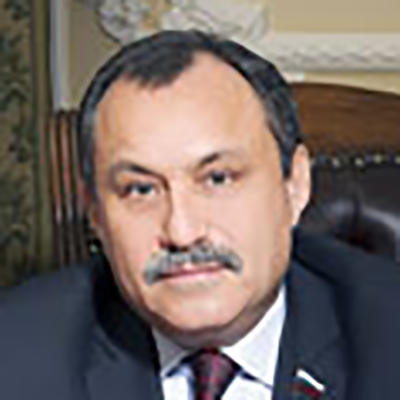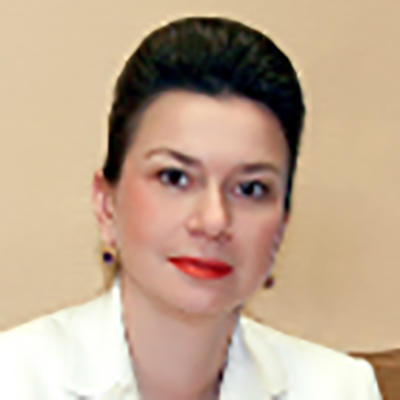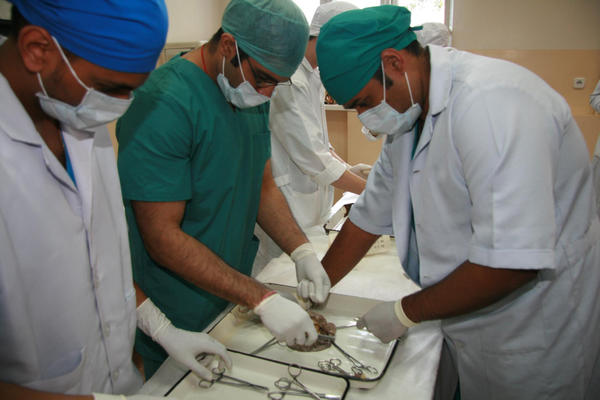Education Export in Kursk State Medical University


Viktor A. LAZARENKO, Rector of Kursk State Medical University, Doctor of Medical Sciences, Professor, Honoured Doctor of the Russian Federation.

Irina G. KOMISSINSKAIA, Vice-Rector for Continuous Education and International Cooperation of Kursk State Medical University, Doctor of Pharmaceutical Sciences, Professor.
Kursk State Medical University has a strong international reputation. KSMU has been handling an important state task of education export development for several decades. Since 1994 the University has been providing teaching to foreign students in English. For the moment the University has signed over 40 agreements with foreign higher education institutions including 12 European universities. About 30% of students are foreigners. The alumni from 61 countries take great pride in having graduated from Kursk State Medical University.
INTEGRATION into the international educational system is one of the University’s priorities that effectively facilitate preservation and strengthening of people health and development of healthcare systems in many countries on the ground of training highly qualified professionals using the best practices of the world medical science and education.
According to the priority program “Development of the Export Potential of the Russian Education System” approved by the presidium meeting of the Presidential Council for Strategic Development and Priority Projects on May 30, 2017, Russia is going to increase the number of international students by 3.5 times.1 It should be noted that KSMU has successfully been working on it for a long time already. The University was in the Top-25 Russian universities for the overall number of international students, trainees, interns, medical residents, doctoral students, students of pre-university training departments in full-time education in the 2014-2015 academic year.2

International students demonstrating their skills at the Surgery Olympiad.
The agreements signed by KSMU with foreign companies are related to the issues of educational service export, student and teaching staff academic mobility, cooperation in the fields of science, education and practical healthcare with foreign universities and health clinics, with international organizations, expert associations, medical councils and chambers of dozens of states, and also the issues of improving international cooperation and representative activities. The outlined interactions are shaping organizational and methodical approaches to the KSMU desired model of educational export development.
Being aware of the importance of the educational service export for the country’s development the university staff makes every effort to draw as many foreign students as possible. The Russian embassies abroad give great support to the University organizing necessary meetings with representatives of the national Ministries of Education and Healthcare.
Recently, in March, KSMU became the first Russian university to have set up a representative office in Malaysia. The official launching ceremony took place in Kuala Lumpur, the capital of Malaysia. Over 300 guests participated in the ceremony including VIPs, representatives of the Ministries of Education and Healthcare, and KSMU alumni. Over 1,000 Malaysians have already graduated from KSMU as medical doctors and are successfully employed in Malaysia both in public and private sectors.
The representative office in Malaysia is a significant achievement, but this is only the beginning of a long journey. Today the same tasks are addressed in the course of discussions with India and Sri Lanka.
Currently over 2,000 foreigners are are studying various educational programs at KSMU.
Out of the total number of foreign students 41.4% are from the BRICS countries, 2.4% are students from the CIS, 28.3% are students from the SCO countries. Distribution of the total number of international students among the continents is as follows: 71.8% of all the students are from the countries of Eurasia, 15.2%—from North and South America, and 13%—from Africa.
ACCREDITATION of KSMU educational programs abroad is directly related to training of highly skilled healthcare personnel and a competitive growth of the University. Today the programs of the University are accredited in 14 countries: Malaysia, India, Sri Lanka, Morocco, Lebanon, Yemen, Sudan, Turkey, Nigeria, Cameroon, Jordan, Thailand, Namibia, and the RSA.
The academic exchange is actively developing by means of joint research projects. For example,international research programs link KSMU departments with the foreign colleagues: the Department of General and Clinical Psychology with the Institute of Further Education in Child and Adolescent Psychotherapy (Austria); the Department of Psychology of Health and Correctional Psychology with Veresies Clinic (Cyprus); the Philosophy Department with the Department of Archive Studies of the Institute of History of Maria Curie-Skłodowska University (Poland); the Department of Neurology and Neurosurgery with the Department of Neurology of Vitebsk State Medical University (Belarus); the Department of Pharmacology with the similar department of the Gomel State Medical University (Belarus) and Nicolae Testemițanu State University of Medicine and Pharmacy (Moldova).
As a member of the International Association of Universities, the Association of Sino-Russian Medical Universities and the Association for Dental Education in Europe, KSMU annually hosts international conferences, applied research and educational events. Educators of the University actively participate in scientific forums abroad and present their achievements at international exhibitions.
Over past six years the number of national and international grants won by the University has increased to 100, which includes 20 international grants and 36 student grants. The total sum of external income from grants amounts from two to ten million roubles per year. KSMU takes part in competitions of different programs and foundations, their number is constantly increasing: the Russian Foundation for Humanities, the Russian Foundation for Fundamental Research, the Foundation for Assistance to Small Innovative Enterprises in Science and Technology (the UMNIK program, the Russian abbreviation stands for: “Member of the Youth Research and Innovation Competition”), the Potanin Foundation, the Council for Grants of the President of the Russian Federation, the Fullbright program, and others. The criteria index of international activity effectiveness related to attracting funds for research from foreign citizens and entities is constantly rising. For example, an agreement for research into DNA for the amount of USD100,000 have recently been concluded by the Research Institute of Genetic and Molecular Epidemiology, an integral part of KSMU. The University and its foreign partners have started the creation of an endowment fund for the KSMU development.

The Day of Knowledge, Rector Viktor A. Lazarenko is handing a student ID card to a first-year student of the International Faculty.
The won grants allow the University staff members to participate in national and international projects and programs as well as to receive training abroad. In turn, the foreign resident medical practitioners and postgraduate students work on and defend their Candidate theses at KSMU. Students from different countries have clinical practice at the University facilities, whereas the Russian students do their practical training at the university clinics abroad.
THE SCIENTIFIC schools of the University guarantee a high level of professional medical training. All academic staff of KSMU, highly qualified professors of 66 departments and four research institutes, are involved in implementation of research and development projects.
Research is an integral part of the University activities. It is aimed at training of medical, scientific and teaching staff in accordance with the concept of the continuous medical education, along with the fundamental and applied research into basic theoretical and clinical bio-medical problems.
In 2016 KSMU became a member of three Scientific and Educational Medical Clusters of the Central Federal District, they are Western-European, Dentistry, and Pharmaceutical.
Following the world and Russian trends of medical education the University actively develops simulation training. The University has the Accreditation and Simulation Training Center, which includes 13 laboratories: Emergency Care Improvement, Surgical Skills Improvement, Obstetrics and Gynaecology, Propaedeutic Skills Improvement, Clinical Psychology, Physico-Chemical Test, Interactive Training, Social Assistance, Paediatrics, Nursing Care, Dentist, Hygienist, and General Practitioner.
It is significant that networking cooperation is widely used in the educational process. For example, medical education in Southeast Asian countries has certain special aspects, that’s why professors from Thailand and Malaysia give lectures on tropical medicine online.
Many times KSMU students became holders of the RF President’s and RF Government’s prizes, winners of national olympiads with international participation such as the Practical Training Olympiad “Gold MedSkill” among all medical higher education institutions of Russia, the Surgery Olympiad named after Academician M.I. Perelman, the General Medicine Olympiad named after N.S. Korotkov, the Pharmacology Olympiad among the higher education institutions of the Central Federal District, the scholarship program “TAKEDA—Gold Frame Medicine,” the scholarship of the Kursk municipal administration. In 2016 the Student Research Association of KSMU was recognized the best in the country, representatives of the University became winners of the all-Russian applied science competition “University Science Race.” Moreover, having presented the greatest number of young scientists’ effective projects, KSMU becomes a launching platform for “University Science Race—2018.”
The University graduates are readily employed by in medical institutions of Russia, including the capital city. The employment rate is 96.1%. KSMU diplomas are recognized in 38 countries of the world; everywhere else they are successfully validated, with nine out of ten graduates doing so on the first try.
As a top-ranked university, KSMU nowadays enrolls more and more prospective students. In 2016 the University was included in the National University Ranking. It took the first position among the universities of Kursk and the tenth position among the medical universities in Russia. A top ranking position is not the target priority for the university. The University puts a lot of effort into training responsible professionals, considerate practitioners, lifelong learners.
Established in 1935
Student body—about 8,000. Medical residency programs—35. Continuing medical education and further professional education programs—in 82 medical and pharmaceutical majors
3, K. Marx Street, Kursk, 305041, Russia
Tel.: +7 471 258-81-37; Fax: +7 471 258-81-37
kurskmed@mail.ru
kurskmed.com
1 For more details please refer to government.ru/news/27862
2 According to Arefev A., Sheregi F. Export of the Russian Educational Services: Statistical Digest. Vol.6, 2016.